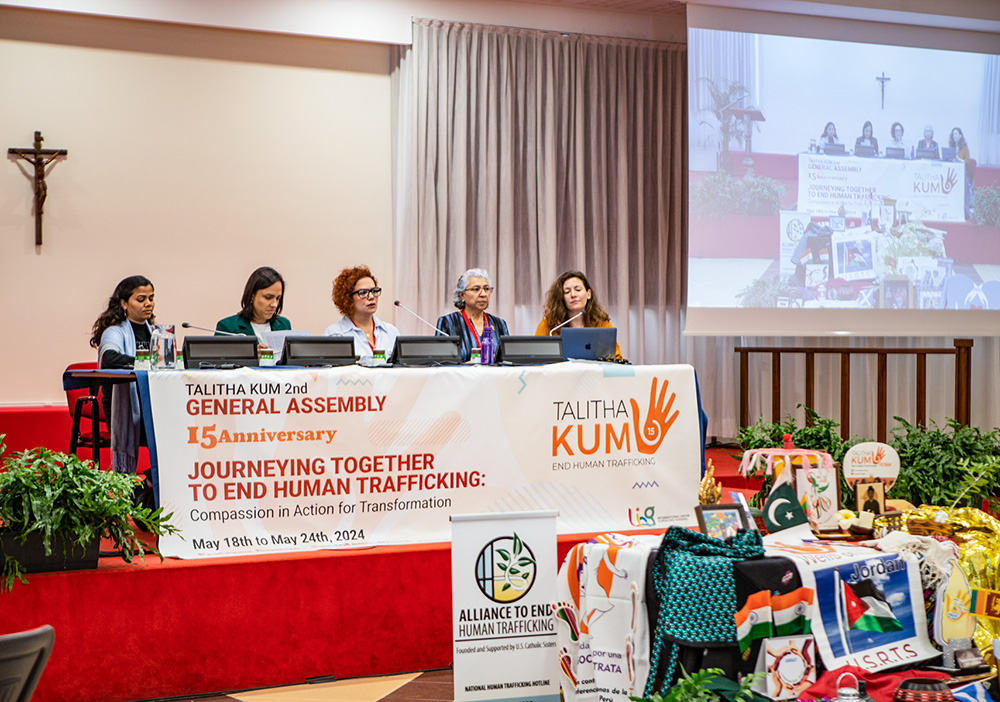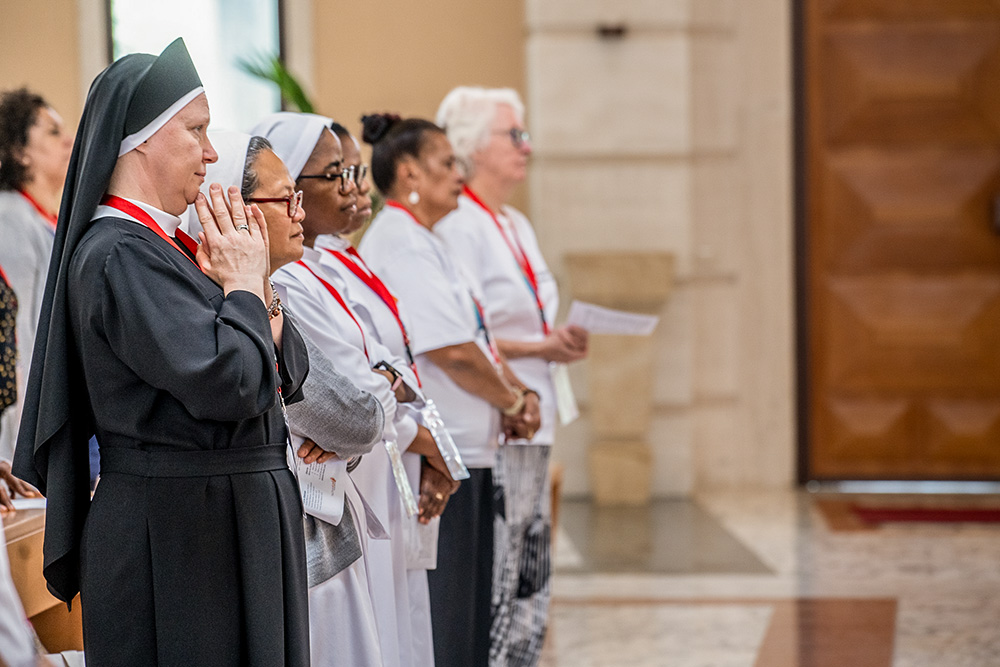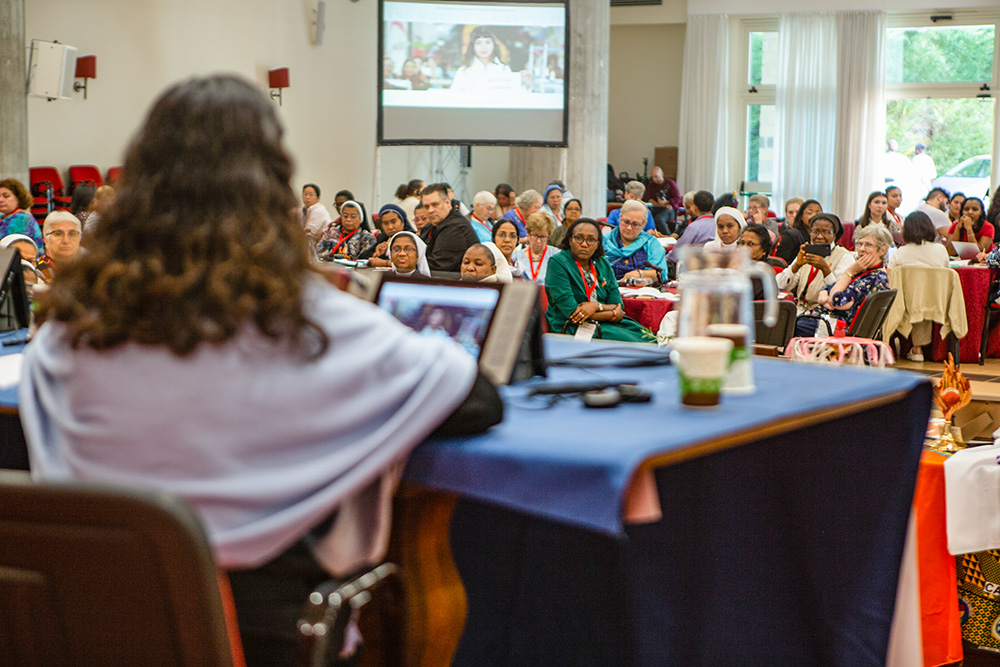
At Talitha Kum's second annual general assembly, held May 18-24 in Sacrofano, Italy, new priorities were presented that will guide the work of the network over the next five years. (Courtesy of Talitha Kum)
One of the world's leading groups combating human trafficking has outlined its priorities for the next five years, which will include a renewed push for systemic change to root out modern slavery, a commitment to a survivor-centered approach to accompanying trafficking victims, and an expansion of global partnerships.
The new priorities were outlined in a final declaration following the second general assembly of Talitha Kum, an international network of women religious against human trafficking. More than 150 delegates from 71 countries met May 18-24 outside Rome to discuss their collaboration under the theme "Journeying Together to End Human Trafficking: Compassion in Action for Transformation."
Daughter of St. Paul Sr. Bernadette Reis, who served as moderator of the May 22 final plenary session, hailed Talitha Kum as a "powerhouse" in the global efforts to eradicate human trafficking.
"Women religious can be found wherever there's a vacuum in society," Reis said. "Wherever there's an infection in society, we are the antibiotics."

More than 150 delegates from 71 countries met in Sacrofano, Italy, for the second annual general assembly of Talitha Kum May 18-24. (Courtesy of Talitha Kum)
Her words were met with applause and she presented the final declaration, which will guide the work of the network over the next five years.
Among the commitments included in the declaration:
- Adopting effective strategies to reduce the demand for human trafficking, including through education for boys and men and advocacy for regular migration pathways.
- Advocating for the prosecution of traffickers and for effective policy and legal changes for at-risk populations, including migrants, refugees, and displaced persons.
- Addressing the push and pull factors of migration and displacement, advocating for the protection and integration of people on the move.
- Exposing the risks of online trafficking and social media by sensitizing young people and their families and promoting cyber safety. ...
- Promoting safe and secure spaces/shelters, survivor-to-survivor peer support and survivor-led initiatives.
Advertisement
- Establishing spaces for non-judgmental listening, hotlines, and mobile app reporting.
- Linking survivors to education, health services, skill-building, housing, legal aid, and job opportunities.
- Offering psycho-social support and providing spiritual accompaniment for survivors, as well as psychological and legal support and training for [Talitha Kum] members and partners. ...
- Stand up for equality between women and men and respect for human rights. ...
- Confronting the impact of climate change and mitigating its underlying causes.
During the weeklong meeting, participants heard presentations on the impact of climate change and conflict, personal testimonials of survivors of human trafficking, reports on the push-and-pull factors of migration, and a sharing of best practices among the anti-trafficking networks.
The structure of the general assembly utilized the same methodological framework as the Vatican's synod on synodality, which relies on roundtable "conversations in the Spirit" to allow each member to voice their own hopes and concerns.

During Talitha Kum's meeting in Sacrofano, Italy, May 18-24, participants heard presentations on the impact of climate change and conflict, personal testimonials of survivors of human trafficking, reports on the push-and-pull factors of migration, and a sharing of best practices among the anti-trafficking networks. (Courtesy of Talitha Kum)
Following the plenary, many of the delegates assembled in Rome on the evening of May 23 for the second annual Sisters Anti-Trafficking Awards. The awards ceremony highlighted the work of three sisters as representatives of their congregations and networks who have "demonstrated exceptional courage, creativity, collaboration and achievement in the protection of their communities from human trafficking."
The 2024 awardees included:
- Canossian Daughter of Charity Sr. Grasy Rodrigues received the Common Good Award for her work in Goa, India, in children's education in the fight against child labor;
- Sr. Anne Victory, who serves on the leadership team of the Sisters of the Humility of Mary and is a well-known anti-trafficking speaker and advocate in the United States, received the Servant Leadership Award;
- Good Shepherd Sr. Marie Claude Naddaf of Lebanon, who helped to open a telephone hotline for a women's emergency shelter for women in Syria, was honored with the Human Dignity Award.
Our Lady of Apostles Sr. Mary Barron, who serves as president of the International Union of Superiors General (UISG), said the awards — which are presented by UISG, the Arise Foundation and the Conrad N. Hilton Foundation (which also funds Global Sisters Report) — are an opportunity to highlight the work of those who "transcend boundaries for the greater good."
Xavière Sr. Nathalie Becquart, who serves as the No. 2 official at the Vatican's synod office and offered the evening's keynote address, praised the work of religious sisters, saying that Talitha Kum "has a lot to share with the church on a wider scale."
You are "prophets of hope in a world much in need of it," Becquart said.





